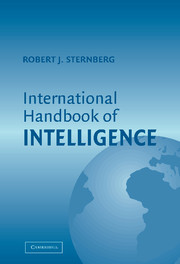Book contents
- Frontmatter
- Contents
- List of Contributors
- Preface
- 1 Intelligence Research and Assessment in the United Kingdom
- 2 Intelligence – Theory, Research, and Testing in the Nordic Countries
- 3 The Psychology of Human Intelligence in Spain
- 4 Psychology of Human Intelligence in France and French-Speaking Switzerland
- 5 Research on Intelligence in German-Speaking Countries
- 6 Is It Possible to Study Intelligence Without Using the Concept of Intelligence? An Example from Soviet/Russian Psychology
- 7 Intelligence Theory, Assessment, and Research: The Israeli Experience
- 8 Intelligence and Intelligence Testing in Turkey
- 9 Intelligence: What Is Indigenous to India and What Is Shared?
- 10 Japanese Conception of and Research on Human Intelligence
- 11 Diligence Makes People Smart: Chinese Perspectives of Intelligence
- 12 Similar Thoughts under Different Stars: Conceptions of Intelligence in Australia
- 13 Being Intelligent with Zimbabweans: A Historical and Contemporary View
- 14 Intelligence Research in Latin America
- 15 North American Approaches to Intelligence
- 16 Human Intelligence: From Local Models to Universal Theory
- Index
- References
3 - The Psychology of Human Intelligence in Spain
Published online by Cambridge University Press: 05 June 2012
- Frontmatter
- Contents
- List of Contributors
- Preface
- 1 Intelligence Research and Assessment in the United Kingdom
- 2 Intelligence – Theory, Research, and Testing in the Nordic Countries
- 3 The Psychology of Human Intelligence in Spain
- 4 Psychology of Human Intelligence in France and French-Speaking Switzerland
- 5 Research on Intelligence in German-Speaking Countries
- 6 Is It Possible to Study Intelligence Without Using the Concept of Intelligence? An Example from Soviet/Russian Psychology
- 7 Intelligence Theory, Assessment, and Research: The Israeli Experience
- 8 Intelligence and Intelligence Testing in Turkey
- 9 Intelligence: What Is Indigenous to India and What Is Shared?
- 10 Japanese Conception of and Research on Human Intelligence
- 11 Diligence Makes People Smart: Chinese Perspectives of Intelligence
- 12 Similar Thoughts under Different Stars: Conceptions of Intelligence in Australia
- 13 Being Intelligent with Zimbabweans: A Historical and Contemporary View
- 14 Intelligence Research in Latin America
- 15 North American Approaches to Intelligence
- 16 Human Intelligence: From Local Models to Universal Theory
- Index
- References
Summary
The scientific study of human intelligence is a relatively recent development in Spain. Its study began early in the twentieth century with a strong influence from psychometrics (Yela, 1956). Nevertheless, current Spanish research on human intelligence covers the main topics within the field, from the structure of human intelligence to its biological correlates.
This chapter begins with a brief review of the history of human intelligence and of the most important databases in psychology, to identify content domains. Second, current research programs are discussed within the context of the international literature. Finally, assessment instruments for the measurement of intelligence are summarized, and data related to their use for practical purposes are presented.
THE HISTORY OF HUMAN INTELLIGENCE IN SPAIN
Human intelligence has a long history as a philosophical issue, but a short one as the subject of scientific inquiry. Therefore, before describing contemporary research in Spain, we should consider some representative thoughts of a sixteenth-century physician-philosopher, Juan Huarte de San Juan, as well as some more modern pioneers in the area.
Main Antecedents
As is widely recognized, Juan Huarte de San Juan (1526–1588?) was a pioneer of experimental and differential psychology, as well as of the study of personality and intelligence. Huarte published the Exam of the Talents for Sciences in 1575. This book presents a quite modern concept of intelligence as a set of mental abilities. The book deals not only with types of intelligence, but also with their application to counseling and personnel selection.
- Type
- Chapter
- Information
- International Handbook of Intelligence , pp. 79 - 103Publisher: Cambridge University PressPrint publication year: 2004
References
- 5
- Cited by

